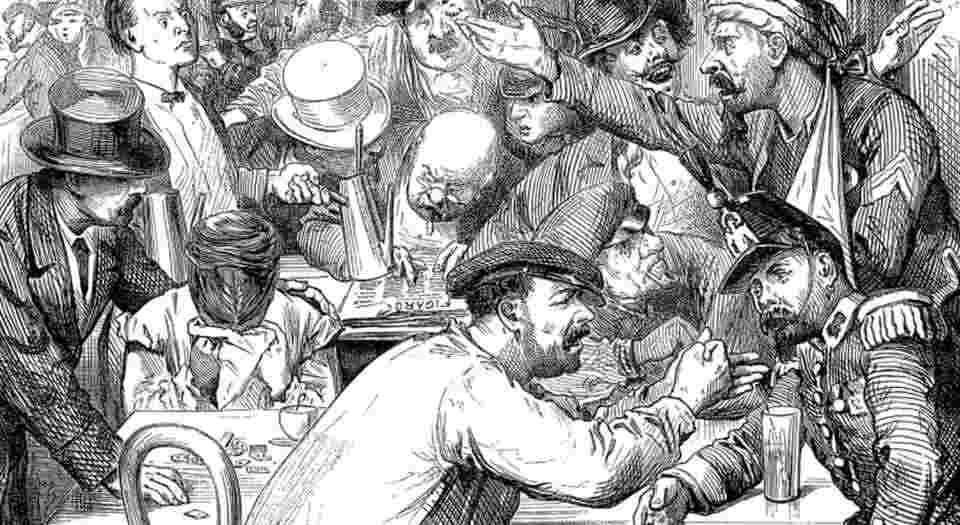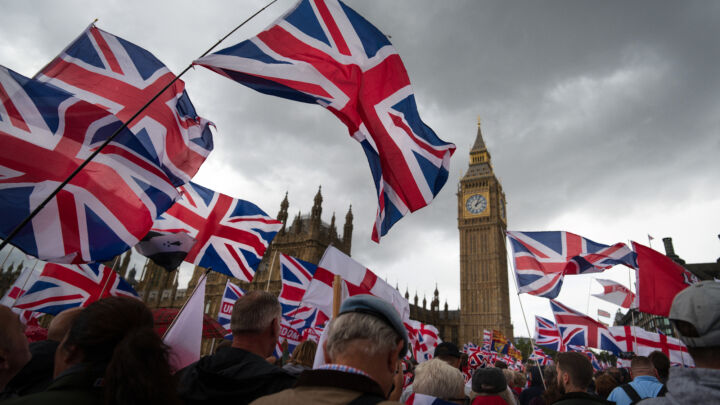
Long-read
Truth and freedom
The new clerisy’s fondness for censorship makes it an enemy of truth.
Want unlimited, ad-free access? Become a spiked supporter.
The most curious thing about the political class’s war in defence of truth is that it coexists with a war against freedom of speech. In one breath, our betters, whether it’s the technocrats of the EU or broadsheet thinkers, bemoan a crisis of truth, claiming that a combination of demagoguery and populist myth-making has propelled the modern West into a ‘post-truth’ era. Yet in the next they express disdain for the ideal of unfettered free thought and debate. Whether they’re instituting laws against ‘hate speech’ or enforcing social stigma against such things as ‘climate-change denial’ or ‘Europhobia’, they exhibit a palpable discomfort with the idea of a fully open public sphere in which nothing is unsayable.
We might even say that in 2017, there are two things that really animate the political and cultural elites of the West: first, their self-styled urge to defend truth, their pose as warriors for honesty against the misinformation of the new populists; and secondly, their agitation with unfettered discussion and with the expression of what they consider to be hateful or outré views. This is striking, because truth without freedom, without the freest possible space in which to debate and doubt and blaspheme, is not truth at all. It is dogma. It represents an assumption of intellectual and moral infallibility rather than a winning and proving of it in the only way that counts: through free public contestation. That our rulers both claim to love truth and fear freedom of speech utterly explodes the pretensions of their moral panic about a ‘post-truth’ era. It’s not truth they want to protect – it’s the authority of their prejudice.
Anybody genuinely concerned with the idea of truth, with deepening humanity’s understanding of itself, nature and society, with encouraging the deployment of reason in order to render the world more knowable, ought to have a natural and in fact quite fierce disposition to freedom of thought and speech. The two go hand in hand. Actually, the one — truth — is reliant on the other — freedom. This point has been consistently argued by liberals throughout the modern period. John Milton, in his passionate plea in 1644 against the licensing of the press in England, famously argued that we should ‘Let Truth and Falsehood grapple; who ever knew Truth put to the worst in a free and open encounter?’ To guard the truth, or what we presume to be true, from free, open discussion is to do truth an ‘injury’, said Milton — it ‘misdoubts her strength’.
Censorship, Milton argued, is the implacable enemy of truth. In fact it is the ‘stop of Truth’. Repressing the utterance or publication of ‘scandalous, seditious, and libellous’ material is often done in the name of preserving truth, he said, but in fact it commits two wrongs against truth. First, in assuming the public should not have to think for itself, and in fact cannot do so, it weakens the public’s intellectual and moral capacities, dulling their ability autonomously to distinguish truth from falsehood. In ‘disexercising and blunting our abilities’, censorship represents a ‘discouragement of all learning’, said Milton. ‘Our faith and knowledge thrives by exercise, as well as our limbs’, he said. That is, we must use our mental and moral muscles, our faculty of judgement, as surely as we use our physical muscles, and censorship prevents us from doing that. And secondly, the censorship of scandal or sedition or ‘evil’ shrinks the sphere of public discussion and thus puts off the potential discovery of greater truths, he argued — by ‘hindring and cropping the discovery that might be yet further made both in religious and civill Wisdome’.
So censorship is hostile to truth both in its implicit doubting of the public’s capacity for critical, truthful thought and in its weakening of the kind of conditions in which old ideas might come to be superseded by newer, more truthful ones. Milton strikingly argued that if someone thinks something is true simply because he has been told it’s true, then this isn’t ‘truth’ in any meaningful sense. He wrote: ‘If [a man] beleeve things only because his Pastor sayes so, or the Assembly so determins, without knowing other reason, [then] though his belief be true, the very truth he holds becomes his heresie.’ Why? Because he has ‘gladly [posted] off to another’ the ‘charge and care’ of his beliefs and worldview. That is, he has outsourced his own moral universe to a higher authority; his belief in truth is passive and childish; truth has been given to him, not discovered or learned by him.
These arguments were pushed further by John Stuart Mill in the late 1800s. In On Liberty, Mill argues that truth and understanding are impossible to achieve in any meaningful way without the fullest possible freedom of speech. Every attempt to silence speech is an ‘assumption of infallibility’ on the part of the authorities, he argued. Censorship encourages dogmatic thinking and rigid conformism, not truth. In Mill’s words, ‘Complete liberty of contradicting and disproving our opinion, is the very condition which justifies us in assuming its truth for purposes of action; and on no other terms can a being with human faculties have any rational assurance of being right.’ That is, truth, or at least the conviction that one is speaking the truth, is utterly dependent on a free sphere that allows for complete liberty of contradicting our ideas, and mainstream ideas.
That today’s elites speak of truth while simultaneously agitating and even legislating against the possibility of ‘complete contradiction’ — that is, complete freedom of speech — suggests truth is not their motor. Rather, they have assumed infallibility; they expect from us an uncritical acceptance of their ideas. They think they are the holders of truth, not because they have subjected their ideology to the liberty of complete contradiction, but because they just know they are right. This is dogma, not truth; it is religion, not politics. In Mill’s words, if your ‘truth’ is not ‘fully, frequently, and fearlessly discussed, [then] it will be held as dead dogma, not a living truth’.
Such has been the belief in the interplay of freedom and truth, and that the latter cannot truly exist without the former, that liberals traditionally argued that not only should we not censor what we consider to be false, but we should actually encourage its expression. Mill, for example, was fascinated by, and impressed with, the fact that even the Roman Catholic Church allows for the expression of falsehood in certain circumstances. Even this ‘most intolerant of churches’ invites a ‘devil’s advocate’ to argue against the canonisation of a saint, he pointed out. The idea there was that truth, even the truth of a saint’s life, didn’t need to be protected against falsehood, and in fact might be improved upon through exposure to falsehood. In the 20th century, Thomas Irwin Emerson, the great American defender of freedom of speech, argued in his book The System of Freedom of Expression (1970) that those who wish to suppress or punish falsehoods, even libellous ones made with ‘actual malice’, fail to ‘take into account that false statements, whether intentional or not, perform a significant function in a system of freedom of expression by forcing citizens to defend, justify and rethink their positions’.
In stark contrast to this profound liberal tradition of associating truth with freedom of speech, and arguing against the suppression of any speech, however wrong or hateful or seditious it might be, today’s so-called liberals and self-styled defenders of truth against what they view as ‘post-truth’ mania are strikingly hostile to freedom of speech. The very same section of society currently arguing for greater respect for truth — what we might call the new clerisy: the insulated, technocratic-leaning political class that has dominated public life for the past 30 years or so — is often at the forefront of using either law or the considerable power of social stigma to prevent or weaken the expression of problematic views. And strikingly, they do this most frequently and most fervently in relation to the things that they consider to be ‘the truth’.
From climate change to the wisdom of pooling sovereignty into institutions like the EU to the ideology of multiculturalism, it is the very ideas our rulers consider to be most important, and most true, that are most feverishly guarded from the complete liberty of contradiction and scepticism — or ‘denial’, as they pejoratively call it. So there is an intense informal stigmatisation of ‘climate-change denial’. Those who question climate-change alarmism will be treated as heretics. Greens and others openly call on broadcasters to jettison their obsession with ‘balance’ and refuse to host ‘climate-change deniers’ because one side in this discussion is telling the truth and the other is lying. As a Guardian columnist argues, media ‘impartiality’ can lend itself to the ‘post-truth’ moment, by giving ‘undue attention to marginal opinion’. In short, we should broadcast ‘truth’ — established, unquestionable truth — and refuse to provide a platform to those who doubt it or refute it. Such an attempt to cleanse the public sphere of that which is considered false, or anti-truth, or post-truth, runs counter to hundreds of years of liberal thought.
Likewise, the ideals of the EU oligarchy have long been presumed to be above the complete liberty of contradiction. An armoury of delegitimising brands has been used to depict criticism of the EU as a species of prejudice, and possibly even a disorder, certainly something that cannot be freely expressed in polite society. The term ‘Europhobia’ suggests opposition to Brussels is an irrational fear, an illegitimate opinion. A writer for New Europe magazine puts ‘Europhobia’ alongside ‘xenophobia, nationalism, Islamophobia and racism’ as a value that is ‘alien to our postwar European culture’. The design is to chill its expression, make it a shameful conviction, unutterable in serious, intelligent circles.
Criticising multiculturalism is likewise demonised. Words like ‘Islamophobia’ and ‘xenophobia’ are deployed not only against those who say genuinely prejudiced things, but also against those who suggest Western liberal values are superior to, say, Islamic values. The informal freezing of full, frank discussion about the ideology of multiculturalism is an attempt to promote with menaces the new value of non-judgementalism, of relativism, above any strong political or moral conviction. The irony — relativism elevated to the status of an unquestionable truth. Hate-speech legislation, actual brute law, is also frequently deployed to the end of preserving the ideology of multiculturalism. The recent legal punishments of Swedish pastors for describing homosexuality as a ‘tumour’ on society, and French animal-rights activists who call halal meat ‘barbaric’, and Danish artists who paint insulting pictures of Muslim migrants, are intended as threatening reminders that the ridicule of other cultures will not be tolerated, and that treating all cultures and lifestyles as equally worthy of respect is the only ‘truth’ that will be tolerated.
That the ‘pro-truth’ technocratic class expends so much energy protecting its core values from contradiction and discussion — whether it is environmentalism (really the value of post-industry), or pooled sovereignty (the value of post-democracy), or multiculturalism (the value of post-judgement) — is very striking. It tells us that what is really happening in this era of concern about ‘post-truth’ is that the prejudices of the 21st-century elites are being reimagined as ‘truths’ that may not be contested freely — that is, they are being turned into dogmas, and put beyond open, unstigmatised public discussion. They are ‘truths’ only in the sense that, in Milton’s words, the Assembly — that is, the political and cultural establishment — ‘determins’ that they are. They are dead dogmas, not living truths. The very insulation of them from unfettered discussion confirms they have more in common with religious diktats than enlightened truths.
For centuries, great liberal thinkers called for freedom of thought and speech because they trusted in two things: in the public’s capacity to decide what is true, and in the robustness of truthful arguments, in the ability of that which is true, or which feels true to us, to survive the rough and shove of public contradiction and even false argument. Today, it is the decline of faith in these two things, in these two fundamental facilitators of truth and enlightenment, that motors the thirst for new forms of censorship, censure and intellectual stigma.
People are no longer trusted to see truth from falsehood; it is no longer believed that, in Milton’s words, the public’s ‘knowledge thrives by exercise’. Rather, the public is viewed as the child-like victim of false claims, of media manipulation, of awesomely powerful advertising, and other forces likely to warp our minds and fill us up with misinformation. Thus we must be protected from the consequences of freedom of speech and be given ‘the truth’.
As one feminist author argues, old liberals’ belief in ‘the ability of people to recognise truth’ was misguided, because there is now a ‘wealth of empirical data from psychology documenting and describing the failures of rational assessment to which people are prone’. Here, strikingly, the new ‘truth’ of empirical data is deployed to the end of denying the capacity of human beings to think rationally and engage fully in public discussion. One of the elite’s new ‘truths’ is that ordinary people have little appetite for or understanding of truth. This is a dogma of disdain for the public’s moral capacity masquerading as a scientific truth that is beyond contestation. And if you challenge the idea that empirical data shows that people are irrational, what will they say about you? That you are ‘post-truth’. That very accusation, of being ‘post-truth’, is now used to chill the very public discussion that makes truth possible.
And they have lost faith in the standing of truth itself, in the ability of truth to win in a ‘grapple with falsehood’. This is because by ‘truth’ they don’t mean the kind of thing that Milton or Mill or other enlightened thinkers were interested in: the profound truth of human understanding, the deep truth of knowledge, the truth of humanity’s unique capacity to know his world, and to change it, too. No, they mean ‘empirical data’, pie charts, narrow, usually very convenient facts, often arrived at through advocacy research designed to discover precisely those facts so that they might be utilised to serve the ends of policing behaviour, re-engineering social attitudes, and other petty political projects. From Milton to Mill, liberals’ conviction that truth would survive and in fact thrive in the public sphere was underpinned by the profundity, the depth, the strength of the truths they were interested in. Today, the low, bureaucratic instinct to protect ‘truth’ from the complete liberty of contradiction is motored by a recognition, at some level, of the hollowness and shallowness of these ‘truths’, of their existence as dogmas for the governance of a critical, sceptical populace rather than as truths for the improvement of humanity’s understanding and conditions.
Everything the new elites say in favour of truth is called into question, shot down in fact, by their instinctive and increasingly institutionalised hostility to the freedom of contradiction and ridicule and blasphemy against their ideals. If you believe something is true, you will be happy to subject it to as much criticism and dissent as possible. As Mill said, the greatest beliefs have ‘no safeguard to rest on but a standing invitation to the whole world to prove them unfounded’. That the new clerisy is unwilling to issue such an invitation, or to permit any strong contradiction of their values and ideas, confirms they have not the remotest interest in truth, and rather are concerned with the maintenance of their dogmatic prejudices over the 21st-century masses.
In such circumstances, heresy must not only be defended; it becomes a duty — the duty of everyone genuinely keen to cultivate a free, enlightened public life in which truth, reason and progress become our guiding principles. We should rail against their dogmas that they falsely describe as truths.
Brendan O’Neill is editor of spiked.
£1 a month for 3 months
You’ve hit your monthly free article limit.
Support spiked and get unlimited access.
Support spiked – £1 a month for 3 months
spiked is funded by readers like you. Only 0.1% of regular readers currently support us. If just 1% did, we could grow our team and step up the fight for free speech and democracy.
Become a spiked supporter and enjoy unlimited, ad-free access, bonus content and exclusive events – while helping to keep independent journalism alive.
———————————————————————————————————————————–
Exclusive January offer: join today for £1 a month for 3 months. Then £5 a month, cancel anytime.
———————————————————————————————————————————–
Monthly support makes the biggest difference. Thank you.








Comments
Want to join the conversation?
Only spiked supporters and patrons, who donate regularly to us, can comment on our articles.